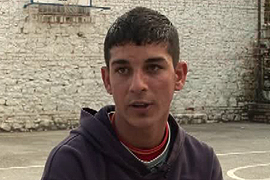Misery for Albania’s child workers
Children as young as five are taken from their families and forced to work abroad.

 |
| Emiliano Fayzo was taken from the streets when he was eight |
Every day, Sophia Sarja cries and wonders if her son will come home.
It has been two years since she last saw Artur. One morning he left as usual to go to the local market. The 11-year-old then simply disappeared from his home village of Elbisan, 60km south of the Albanian capital, Tirana.
“I can’t explain with words, I say every day, all day ‘Let’s hope I will see him again’. I say to God ‘please, please let him be healthy and safe’,” she says.
Locals believe that Artur has been abducted by trafficking gangs, who have taken him abroad and forced him to work, making him another example of slavery in the 21st century.
An international conference organised by the Council of Europe is currently under way in Greece, to discuss ways to tackle the growing problem of human trafficking.
While media coverage of trafficking for the international sex trade is high, one abuse that often goes unreported is the kidnapping of children, by criminal gangs who then force their victims to work.
There has been an alarming increase in the trafficking of boys in south-eastern Europe. They are generally being traded for cheap labour, begging and drug-running.
Family knowledge
A report carried out by the International Organisation for Migration found that 70 per cent of trafficking cases investigated last year in Albania were male, 93 per cent of them minors.
Sadly, they are often trafficked with the tacit approval of their families.
 |
| Sophia Sarja prays every day she will see her son, Artur, again |
Emiliano Fayzo was dragged off the streets at the age of eight and taken across the border to Greece. There he was forced to work for a gang of criminals.
He still bears the scar of when he was stabbed for refusing to work. The wound has never been properly stitched or treated.
“They told me ‘you’re going to steal’. I said ‘no I won’t do it, but they beat me, they beat me every day,” he says.
Unicef has filmed Albanian youngsters who have been trafficked to Greece working on the streets. Some as young as five are forced to spend up to eight hours a day selling roses or napkins to tourists.
Edisen Turshini spent six months doing just that. He was taken south from the border town of Korce after his mother was given about $300 by a relative who wanted to make the boy work.
“I was telling them I want to go back to Albania, I want to go home back to my parents,” Edisen says. “But they kept telling me ‘No you have to stay a bit bit longer, you have to stay to make more money to take back to your mother.'”
“Life is very hard”
In her one-roomed home in Korce, with the beans that will feed the family for the next two days bubbling on the stove, Edisen’s mother tells Al Jazeera that she did not sell her son.
“We didn’t have anything to eat. Here when it rains, all the water that is outside gets inside. Life is very hard. Some people sell their children because they are criminals. I did not sell my son.”
The Albanian government’s anti-trafficking minister has previously said the problem will never go away, but it is getting better and tighter border controls have been implemented to make it harder for the traffickers to continue their illicit trade.
But in the hills surrounding Korce and neighbouring communities, the criminals continue to transport their human cargo, often at night when it is easier to hide.
In Korce, Unicef is helping a local school give a second chance to children that have been trafficked and those at risk of being sold.
They are given the education they have missed out on before and are given training in trades that could in turn secure them full-time employment.
In the music class, one girl sings a traditional Albanian song. “Nobody should dare touch the happiness of children,” it says.
It perhaps promises a better future after the problems of the past.